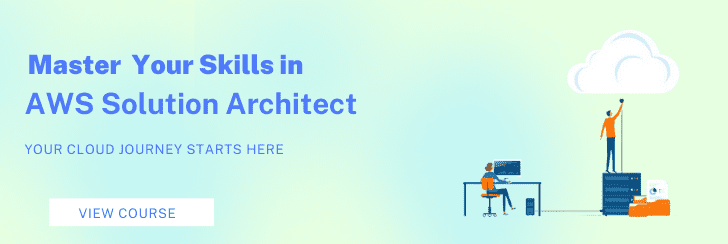Cloud Engineer Salary - For Freshers and Experienced in 2024
-
 By Sushmith
By Sushmith - Published on Apr 10 2023

Table of Contents
Introduction
Cloud Engineer Salary for Freshers and Experienced Job Roles
To begin with, let’s first get to know about the different roles that comprise the cloud engineer’s job before we begin discussing the cloud engineer salary. It is very important to know everything about the domain before even getting started with it. Only when you understand the different roles, benefits, and future scope available for the domain in the market can you decide which role to target and plan accordingly.
The expectations for the growth of the cloud servicing market have increased the demand for a cloud engineer manifolds. The cloud engineering domain serves advantageous results not just for aspirants beginning their careers in this domain but also for professionals looking forward to shifting their career path into the cloud domain. All that is required to fully benefit from this rapidly growing domain is a well-respected and related certification.
AWS (Amazon Web Service), Microsoft Azure, and Google Cloud are the top three primary cloud-servicing platforms used by most organizations to manage data and tools using cloud computing and track the usage of data in real time to keep data secure. Gaining a certification in these subjects allows candidates to access and develop new skills that help organizations manage data more easily and help them secure the data.
For any Cloud Computing related job role, the Impact of AWS Certification now plays an impactful role. To any aspirants willing to make their career in this trending domain, the AWS Developer Associate Training Course can help make a landing in desired job role in the cloud computing and cloud servicing domain since there are no prerequisites for this certification.

What makes a Cloud Engineer?
"What does a cloud engineer do?" To answer this question, we must first understand the role of a cloud engineer in the field of cloud engineering.
The main objective of a cloud engineer in any organization is to help the IT security team in designing and managing the cloud computing environment. Cloud engineers may as well combine cloud computing roles with a few cybersecurity roles. This allows engineers to handle tasks related to both domains.
With the increase in demand, organizations also expect a fine resolution skill from candidates that choose this profession as a career path. Hence, it is very important for candidates to understand what skills to use and apply for a particular role. The following are some of the basic skills that can help you understand the responsibilities of a cloud engineer better.
Basic Skills of a Cloud Engineer
To master any technical skill or a technical development role, it is very important to first master the basic skills required to clearly understand the depth of the subject and the domain.
Linux: For operations like cloud designing and cloud development, organizations highly rely on the Linux operating system. This makes understanding Linus OS one of the must-have skills for cloud engineers.
Database Skills: To extract and navigate data and files from the cloud storage, it is mandatory for cloud engineers to have the necessary understanding about the workings and functionalities of database software.
DevOps: DevOps experts are one of the most sought-after candidates by major cloud providers. Since it is a foundational concept and a popular framework in cloud engineering, having hands-on experience with DevOps practices would be an advantage.
Programming: Having a keen understanding and clear knowledge of programming languages is one of the must-have skills for cloud engineers. These languages involve SQL, Java, Python, and PHP.
Networking: Understanding general network management functions and virtual networking concepts is a must-have skill for professionals at this point.
Security and Recovery: As discussed, cloud engineers also share similarities with cybersecurity in order to maintain data privacy. Hence, having some understanding of cybersecurity concepts and skills in the cloud is advantageous.
Cloud Service Providers: To keep it simple, it takes different levels of skill to match with different service providers. Hence, it is important to make a note and also understand and practice the practical application of all the available features provided by different cloud service providers.
Top Trending and In-Demand Job Roles for Cloud Engineers
Now that we've gotten a little familiar with all the other necessary details, let's discuss the available job titles that are trending in the cloud computing domain. The following are a few job titles for cloud engineers that are currently trending. We’ll also discuss the basis and average Cloudy Engineers Salary.

Job titles mentioned in this section might seem irrelevant when compared to other organizations' job descriptions, but in general, the responsibilities of these roles remain the same in every organization.
– Cloud Solution Administrator
This is an IT professional role for IT specialists who specialize in cloud infrastructure management. Individuals with this title are responsible for handling and updating employees and users on how to access the cloud services, as well as managing security protocols.
The requirement for this profile is a bachelor’s degree in computer science, information science, or any related field, together with three to five years of experience in IT administration or system security.
Annual Average Salary: 70K USD (ranges from 65K to 82K)
– Cloud Security Analyst
Professionals with this title are responsible for analyzing the security protocols of companies cloud infrastructure. By performing tasks like accessing threats, analyzing breach incidents, and eliminating breach threats, cloud security analysts secure companies data in the cloud.
The requirement for this professional is to have a bachelor’s degree in computer science, information technology, or cybersecurity together with a specialization in security analysis.
Average annual salary: 92K USD (range: 72K to 117K)
– Cloud Network Engineer
In this IT role, professionals maintain networking cloud services for organizations under a dedicated service division. Network specialists might share their tasks with cloud architects, who help in taking conclusive decisions when designing cloud-based infrastructure.
The requirement for this profile is a bachelor’s degree or a higher degree in computer science or software engineering, focusing on server and network infrastructure or security.
Annual Average Salary: 94K USD (ranges from 82K to 108K)
– Cloud Automation Engineer
IT professionals with this title are necessary for designing, implementing, and maintaining cloud automation technologies. The demand for data migration to cloud servers will help organizations minimize repetitive tasks.
The requirement for this title is a bachelor’s degree in computer science or information science, together with specialization in automation concepts such as machine learning
(ML) and AI (Artificial Intelligence).
Annual Average Salary: 122K USD (ranges from 100K to 155K, including profit shares.)
– Cloud Data Scientist
With the demand for analyzing all the cloud data generated by IOT applications, the demand for cloud data professionals and scientists in this role is higher. Organizations, after migrating all physical data to cloud-based platforms, need cloud data scientists to organize all the data and make it usable and accessible at any instance.
The requirement for this profile is a bachelor’s degree or a higher degree in related fields such as computer science and data science. Additionally, a double major in statistics is very helpful.
Average salary: 130K USD (ranges from 107K to 170K)
Conclusion
Because there are fewer cloud engineers, the job is more demanding and also pays well. This increase in demand and the expectations for the growth of the cloud servicing market have increased Cloud Engineer Salary and the demand for a Cloud Engineer manifolds. This rising demand for cloud engineers and data scientists makes it necessary for organizations to make the Cloud Engineer Salary reasonably better for many reasons.
Cloud Engineer Salary not only depends on the qualification of a professional candidate’s skills and experience but also varies with respect to the organization's job description. It is important to plan out which path to take, how to proceed, and what organizations to prefer for a certain role.
SprintZeal is here for you to help with the same. We offer industry-grade training and also provide globally recognized certifications that can put your resume on top. Explore all our cloud computing courses and enroll now to successfully land your desired profession.
Visit our all courses page to explore the variety of services offered for the courses provided. To proceed further or to clarify any course-related doubts, request a callback or text with our course expert now.
Subscribe to our Newsletters
Popular Programs
Microsoft Azure Administrator Associate AZ-104
Live Virtual Training
- 5 (560 + Ratings)
- 17k + Learners
AWS Certified Solution Architect Professional
Live Virtual Training
- 5 (300 + Ratings)
- 35k + Learners
AWS Certified DevOps Engineer Certification Training
Live Virtual Training
- 4.2 (400 + Ratings)
- 17k + Learners
Microsoft Azure Infrastructure Solutions (AZ-305)
Live Virtual Training
- 4.3 (560 + Ratings)
- 32k + Learners
Trending Posts
Amazon Certifications: List of Top AWS certifications in 2024
Last updated on Feb 7 2024
Tips and Best Practices for Data Breaches in Cloud Computing
Last updated on Oct 21 2024
A Step-by-Step Guide to Git
Last updated on Nov 29 2022
Cloud Computing and Fog Computing - Key Differences and Advantages
Last updated on Jun 19 2023
AWS Architect Interview Questions - Best of 2024
Last updated on Feb 24 2023
AWS Lambda - An Essential Guide for Beginners
Last updated on Mar 9 2023
Categories
- Agile Management 54
- AI and Machine Learning 42
- Big Data 53
- Business Management 51
- Cloud Computing 44
- Digital Marketing 56
- Information Security 8
- IT Hardware and Networking 17
- IT Security 103
- IT Service Management 29
- Leadership and Management 1
- Microsoft Program 2
- Other 43
- Programming Language 31
- Project Management 162
- Quality Management 75
- Risk Management 8
- Workplace Skill Building 2
Trending Now
Azure Vs Aws - Which Technology Is Better
ebookThe Impact of Internet of things on Marketing
ebookAWS Lambda - An Essential Guide for Beginners
ebookCareer in Cloud Computing or Cyber Security
ebookImpact of AWS Certification On Cloud Computing Jobs
ebookAmazon Certifications: List of Top AWS certifications in 2024
ebookAWS Interview Questions and Answers 2024
ebookWhat is Cloud Computing? - Fundamentals of Cloud Computing
ebookAmazon Software Development Manager Interview Questions and Answers 2024
ebookAWS Solutions Architect Salary in 2024
ebookAWS Architect Interview Questions - Best of 2024
ebookHow to Become a Cloud Architect - Career, Demand and Certifications
ebookAmazon EC2 - Introduction, Types, Cost and Features
ebookAWS Opsworks - An Overview
ebookAzure Pipeline Creation and Maintenance
ebookCI CD Tools List - Best of 2024
ebookBenefits of Cloud Computing in 2024
ebookTrends Shaping the Future of Cloud Computing
ebookContinuous Deployment Explained
ebookDevOps Career Path – A Comprehensive Guide for 2024
ebookTop Kubernetes Tools in 2024
ArticleJenkins Interview Questions and Answers (UPDATED 2024)
ArticleA Step-by-Step Guide to Git
ArticleScalability in Cloud Computing Explained
ebookIoT Security Challenges and Best Practices-An Overview
ebookHow to Learn Cloud Computing in 2024 - A Brief Guide
ArticleCloud Engineer Roles and Responsibilities: A complete Guide
ebookTypes of Cloud Computing Explained
ArticleEssential Cybersecurity Concepts for beginners
ebookWhat is a Cloud Service - A Beginner's Guide
ebookTop 3 Cloud Computing Service Models: SaaS | PaaS | IaaS
ArticleWhat is Private Cloud? - Definition, Types, Examples, and Best Practices
ebookWhat Is Public Cloud? Everything You Need to Know About it
ArticleTop 15 Private Cloud Providers Dominating 2025
ebookWhat Is a Hybrid Cloud? - A Comprehensive Guide
ebookCloud Computing and Fog Computing - Key Differences and Advantages
ebookAzure Architecture - Detailed Explanation
ArticleMost Popular Applications of Cloud Computing – Some Will Shock You
ArticleTips and Best Practices for Data Breaches in Cloud Computing
ArticleWhat Is Edge Computing? Types, Applications, and the Future
ArticleMust-Have AWS Certifications for Developers in 2025
ArticleSalesforce Customer Relationship Management and its Solutions
ArticleSpotify Cloud: Powering Music Streaming Worldwide
Article
















